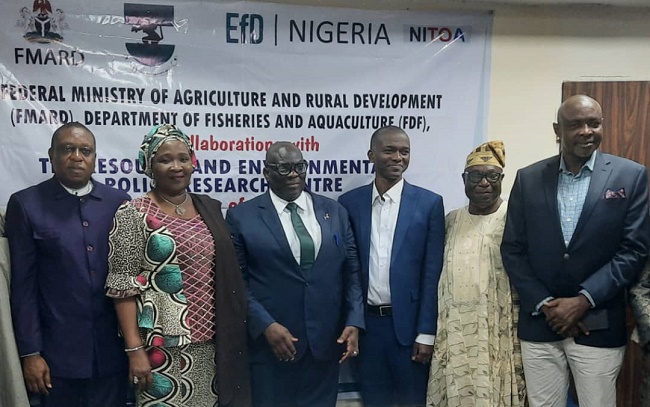Stakeholders in the Nigerian fishery industry are calling for the review of the Sea Fisheries Act 1992 to ensure sustainable fisheries resources, viable living and an increase in internally generated revenue for the nation.

This was agreed on during a stakeholders’ workshop organised by the Federal Ministry of Agriculture and Rural Development in collaboration with the Resource and Environmental Policy Research Centre, Environment for Development (REPRC EfD-Nigeria) of the University of Nigeria, Nsukka, which held on Tuesday, November 15, 2022, in Lagos.
In his opening speech, Permanent Secretary, Federal Ministry of Agriculture and Rural Development, Dr. Ernest Umakhihe, elucidated the importance of the fisheries sector to the economic survival of the country especially the non-oil sector.
He said: “As a coastal nation, Nigeria has a coastline of 853 kilometres and in continental shell of 37,934sq kilometres, Nigeria declares 200 nautical miles exclusive economic zone and thus has the sovereign right for the purpose of exploiting, ensuring, conserving and managing its fisheries economic zone.”
Dr. Umakhihe, who is of the opinion that the current Sea Fisheries Act 1992 is outdated after 30 years of promulgation, stated that reviewing the document at this time would go a long way in benefiting not only the active players in the industry but also the Federal Government due to its money-spinning nature as a non-oil sector.
According to him, nine of the 36 states of Nigeria have a coastline with the Atlantic Ocean, thus the waters require proper management, conservation and protection in order to ensure sustainable fisheries resources.
On the recent flooding incident that ravaged many parts of the country washing away many fish farms in various locations in Nigeria, the Permanent Secretary assured all stakeholders of the support of the Ministry in ensuring they have a new lease of life.
Represented by Director of Special Duties, Mrs. Fausat Lawal, Dr. Umakhihe said: “The Ministry is ready to standby fish farmers following flooding in the country, as a result anybody that brings files for approval to the table, if the issue of flood is not represented will not be treated. The Ministry stands by the farmers and will stand by them all through.”
On his part, Director, Fisheries and Aquaculture Department, Mr. Ime Umoh, highlighted the reason why the review is very necessary especially after 30 years of the current Sea Fisheries Act 1992 was enacted.
“With 3.6 million metric tonnes per annum, we are not really able to meet up the standard, we are only able to produce about 1.25 metric tonnes per annum through industrial aquaculture and artisanal sectors and other deficits,” he said.
Mr. Umoh added: “We are supplementing the importation and as a country we know that the importation of frozen food is not sustainable so we must try our best to reduce the deficit and domesticate fish production. As a department, we are intervening in all the sectors, especially the aquaculture sector by introducing a processing system and by giving out one tonne fish meal to the farmers and other intervention areas that will help us increase fish production in Nigeria.”
President, Nigeria Trawler Owners Association (NITOA), Mrs. Ben Okonkwo, appreciated Federal Ministry of Agriculture and Rural Development and REPRC EfD-Nigeria for identifying with NITOA as a major stakeholder in the industry and hopes that the review of the existing act brings about positive changes to the industry as a whole.
“We are hoping that the government understands the importance of the fishing subsector as one of the federal government’s non-oil revenue-generating units and will like to guide it jealously in ensuring that investors do not close their shops due to biting cost of operations,” she noted.
Mrs. Okonkwo however hope that when this reviewed act is promulgated, it shall be sustainable in such a way that it will not further stiffen the industry, contravene the existing federal government policy on the ills of doing business and will not ultimately push the fishing industry into extinction.
Vice Chancellor, University of Nigeria, Nsukka, Professor Charles Arizechukwu Igwe applauded the Federal Ministry of Agriculture and Rural Development for collaborating with the REPRC EfD-Nigeria for organising the workshop at the time when Nigeria economy can benefit immensely from it.
He said: “The involvement of stakeholders from different parts of the country in the workshop underscores their interest in reviewing the Sea Fisheries Act of 1992 to meet the demands and expectations of Nigerians in fish production and consumption.
“As a research institute, the University of Nigeria Nsukka, through the REPRC EfD-Nigeria, will continue to carry out cutting-edge research to facilitate the institution and implementation of evidence-based policies to enhance Nigeria’s economic development and poverty reduction.”
The organiser of the workshop and the Director, REPRC EfD-Nigeria, Dr. Nnaemeka Chukwuone, is of the opinion that the existing Sea Fisheries Act 1992 is outdated after 30 years of existence and its review is long overdue so that all stakeholders can enjoy being a part of the industry.
Dr. Chukwuone believes that “without a good institutional framework, we will not be able to control what’s happening in the fisheries sector, and after 30 years of the current act, there are a lot of problems and things happening to fisheries and aquaculture sector. The Act, if and when passed by the National Assembly into law, it will be a good business for Nigerians because the Fisheries Act is key to maintaining, sustaining and regulating the activities in both fisheries and aquaculture sector of the economy.”
Dignitaries at the workshop include President, Catfish Farmers Association of Nigeria (CAFAN), President, Fisheries Society of Nigeria (FISON); Professor Emmanuel Oladipo; and Dr. Ebele Amuechina, among others.
By Adedoye Ajibola Saheed
